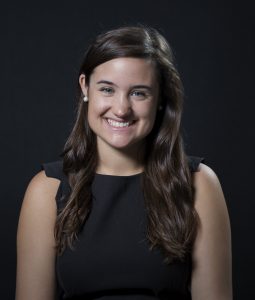ELIZABETH PATTERSON ’14

Elizabeth Patterson is an Associate Producer for Jack Morton Worldwide in NYC. She graduated with a double major in Theatre and Communications. Her main message? Network! Read on to her about Elizabeth’s path since Wake.
Associate Producer
Jack Morton Worldwide
New York City, NY
WFU Class of 2014
Major: Communications with Media Studies focus & Theatre
DeacLink: What did you study while you were at Wake?
Elizabeth Patterson: I was a theater and communications double major, with a media studies concentration.
DL: Since you’ve graduated, how has your career unfolded? Can you walk me through your path from graduation day to your current job?
EP: My career path started when I was at Wake. I loved theatre, but didn’t want to pursue performing professionally, so I explored the operational side of art organizations. A few Wake alumni recommended Berkshire Theatre Group, as they had interned there and made key connections in the industry. I ended up at BTG for two summers – first in the box office, and then as the Development Assistant. In development, I connected with high-level donors and helped with fundraising campaigns, but my bigger role was assisting with their annual summer gala.
While in the Berkshires, I made contact with a family friend, who learned more about my role in events at BTG. As a theatre major herself, she introduced me to a new way to merge my goals and passion through experiential marketing at Jack Morton Worldwide.
I started at Jack Morton Worldwide as a freelance Production Assistant, going onsite to my first event between exams and graduation. Moving up to NYC for a temporary job, I was introduced to my team as the freelancer that was here indefinitely. I have never turned back. This industry operates with a lot of freelancers, so I was a permanent freelancer for three years until joining the Jack Morton staff full time last year. This has given my an opportunity to develop my skills, working up to an Associate Producer on the production team.
My job is essentially corporate theater – I produce shows. It can be anything from a local, internal board meeting, to top-tier talent performing an original show in an exotic location. It wasn’t my original industry, but when I look back there was a clear path here. It perfectly applies to both of my college majors, and has given me a way to tap into both my creative and business interests.
DL: How did you find and apply to the various positions you’ve held?
EP: Networking! As mentioned, I found BTG through Wake alumni, and I ended up finding my current role through a family friend. An in-person conversation is always best, but any form of connection is beneficial. Most people remember what it will like as a college student or recent graduate looking for job opportunities – it can be intimidating so Alumni want to help.
DL: This route is an interesting option for art alums considering we don’t have a formal arts administration program. What advice do you have for readers interested in breaking into the field?
EP: For me, I discovered that my liberal arts background gave me the rudimentary skills applicable to my role. Also, a bonus with liberal arts is creative thinking, which is harder to teach post-college. For the skills that I wanted more expertise in, I found there are multitude of platforms to continue learning of specific skill-sets. I have used online programs like Lynda, or searched for local seminars in the area for certain skills that I want to learn more about. For a niche market like mine, you apply a lot of different backgrounds and skills, so I am always trying to find additional ways to round out my expertise.
DL: What could Wake have done better to prepare students for life after graduation?
EP: One of the best things that Wake Forest did for me was providing the career trek to network through the OPCD. We came to New York for a few days, to tour companies and network with alumni. While it was a great opportunity, Wake could have done more to prepare us for the trek and coach us on the follow-through of the networking, to give us a more well-rounded experience. I was overwhelmed at the Alumni networking party, and I think that with more preparation and post follow-up I would have made stronger connections with alumni. Looking back on it, it was a missed opportunity for me, but an easy fix would be a longer program, giving me best practices for networking going in, and goals set in place to follow up with alumni post event.
DL: What is your favorite part of living and working in New York?
EP: New York is one of the biggest cities in the world, and one of the most diverse. It is special because of the cultures and people that make it unique – creating everything from world-renowned events to the family-owned restaurant. I was excited to move here because of the bucket-list NYC items that I had heard about, but what has kept me here are the little experiences that have made me feel like a true local.
DL: What is your favorite part about working for Jack Morton?
EP: My team. I have traveled all over the world, working on amazing projects, but that isn’t rewarding unless you like the people around you. Some of my closest friends I have made from work – we work long onsite hours, but then we still hang out post-event to enjoy where we have traveled. My colleagues have helped me grow since I joined the team, and there is mutual trust that ensures success for a project.
DL: What’s the best kernel of advice you can think to pass on to current students and recent alums?
EP: All of my advice comes back to networking. Reach out. It’s always worth it.
